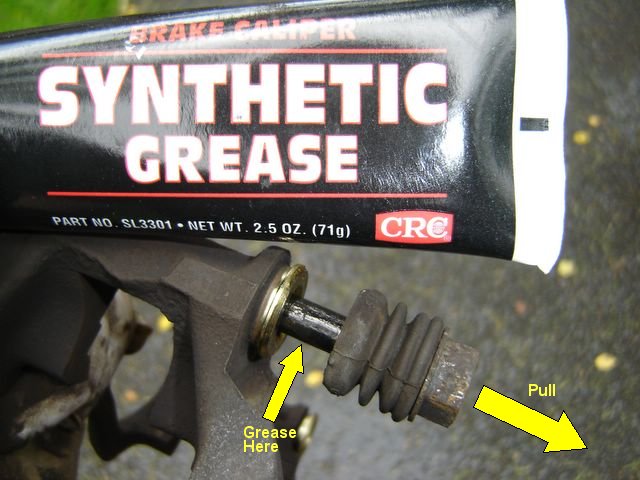To lubricate brake caliper pins, it is recommended to use a high-temperature synthetic brake grease. This type of lubricant provides effective protection against corrosion and helps optimize brake performance.
Choosing the right type of lubricant for brake caliper pins is crucial for maintaining optimal brake performance and ensuring the longevity of your braking system. Brake caliper pins play a vital role in allowing the smooth movement of the caliper, resulting in effective braking.
However, without proper lubrication, these pins can become corroded or seized, leading to decreased braking efficiency and potential damage to other components. Therefore, using the appropriate lubricant is essential.
This article will discuss the best lube for brake caliper pins, highlighting the importance of high-temperature synthetic brake grease in protecting against corrosion and maximizing brake performance.
Importance Of Brake Caliper Pin Lubrication
Brake caliper pin lubrication is of utmost importance for the optimal functioning of a vehicle’s braking system. The brake caliper pins play a crucial role in the smooth operation of the brake calipers, which are responsible for squeezing the brake pads against the rotors to slow down or stop the vehicle.
Proper lubrication of these pins ensures smooth movement, reduces friction, and prevents excessive wear on the brake components. It also helps to distribute heat evenly, preventing the caliper from seizing up due to overheating. When brake caliper pins are not lubricated correctly or lack lubrication altogether, several issues can arise.
Excessive friction can lead to uneven brake pad wear, reduced braking performance, and potential damage to the caliper assembly. Improper lubrication can also cause the caliper pins to stick, resulting in a dragging or sticking brake, and possible overheating.
To ensure the longevity and optimal performance of the braking system, it is essential to utilize the appropriate lubricant specifically designed for brake caliper pins. Regular inspection and maintenance of the brake calipers, including lubrication of the pins, should be part of routine vehicle maintenance.
| Functions of Brake Caliper Pins |
|---|
|
| Consequences of Improper Lubrication |
|
Types Of Lubricants For Brake Caliper Pins
There are various types of lubricants that can be used for brake caliper pins. Silicone-based lubricants are popular choices as they offer temperature resistance and do not break down easily. They also provide excellent lubrication and reduce friction between moving parts.
Synthetic brake lubricants, on the other hand, are designed to withstand high temperatures and offer long-lasting performance. They are specially formulated to resist water and contaminants, ensuring smooth operation of the caliper pins.
Copper-based lubricants are known for their anti-seize properties, preventing the caliper pins from sticking or seizing. They are highly resistant to extreme temperatures and can withstand heavy loads.
How To Properly Apply Brake Caliper Pin Lubricant
-
Gather the Necessary Tools: Before starting, gather the tools and materials you’ll need:
- Brake caliper pin lubricant (high-temperature silicone or synthetic grease)
- Brake cleaner
- Wire brush
- Clean rags or paper towels
-
Lift and Secure the Vehicle: Lift the vehicle using a jack and secure it on jack stands to ensure a safe working environment.
-
Remove the Caliper: Depending on your vehicle, you may need to remove the caliper to access the caliper pins. Consult your vehicle’s service manual for specific instructions.
-
Clean the Caliper Pins: Use a wire brush to remove any dirt, corrosion, or old lubricant from the caliper pins. Clean until the pins are smooth and free of debris.
-
Apply Brake Cleaner: Spray brake cleaner on the cleaned caliper pins to remove any remaining residue. Wipe them dry with a clean rag or paper towel.
-
Apply Brake Caliper Pin Lubricant: Using a clean applicator or your fingers, apply a thin, even layer of brake caliper pin lubricant to the pins. Be sure to cover the entire surface for optimal lubrication.
-
Reassemble the Caliper: If you removed the caliper, carefully reassemble it, ensuring all components are properly aligned. Follow your vehicle’s service manual for torque specifications.
-
Repeat for All Caliper Pins: If your vehicle has multiple caliper pins, repeat the cleaning and lubrication process for each one.
-
Test the Brakes: Before driving, pump the brake pedal to ensure that the caliper pins are functioning smoothly. Listen for any unusual noises and confirm that the brakes engage properly.
-
Lower the Vehicle: Carefully lower the vehicle from the jack stands.

Credit: bobistheoilguy.com
Conclusion
Ensure your brake system works smoothly by using the right lube for your caliper pins. With proper lubrication, you can prevent corrosion and wear, ultimately prolonging the life of your brakes. Selecting the appropriate lubricant will lead to better performance and overall safety for your vehicle.
Make the right choice for your brake caliper pins today.
